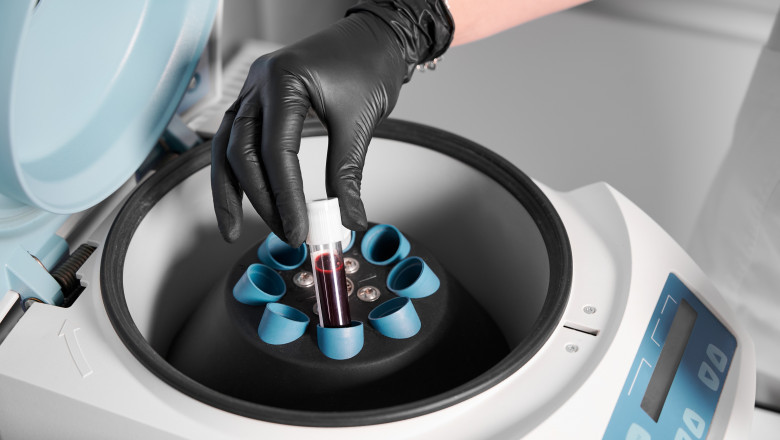views

A centrifuge is an essential laboratory equipment valued for its precision and reliability. However, acquiring the latest, high-quality models isn't always feasible. When chosen wisely, a used centrifuge can provide both efficiency and cost-effectiveness. By weighing the benefits and drawbacks of used lab equipment, you can determine if it’s the right choice for your needs.
Hence, here in this blog, you will see the critical considerations you must make when finding a used laboratory centrifuge for sale. Along with that you will get to learn about its numerous advantages and some drawbacks.
Considerations For Buying A Used Laboratory Centrifuge
Here are the major factors you should consider when you buy used laboratory centrifuge:
Analysis
A thorough assessment of your lab's needs can save you time and money in the long run.
Comparing the capabilities of several models of the same product can help you decide whether it's worth paying more for advanced features. Analyzing a device's specific functionalities guarantees that it meets your laboratory's research needs. Equipment size, speed, and compatibility are all crucial elements to consider.
Overall, a thorough examination can help save time and money in the long run.
Authorized Seller
When purchasing used lab centrifuges, it is critical to select a reputable vendor to ensure that you receive the exact equipment you requested. Many sellers out there sell duplicate items or faulty equipment.
Obtaining a full-use history report from a seller is impossible, but a vendor with an outstanding reputation is a great place to start. Establishing trust is crucial, and evaluating a provider based on client feedback can be helpful. Recognizing common indications of fraud and deceitful sellers in advance can be quite beneficial.
History of Centrifuges
Obtaining a centrifuge with a detailed operation history can save time and research by allowing access to maintenance logs. Understanding the prior owner's usage and idle time will help you make better decisions.
Purchasing an instrument from a source that no longer provides replacement parts is not advisable. Additionally, buying a used centrifuge that consumes more power than energy-efficient ones can counterbalance the cheaper cost.
Remaining Service Life
A centrifuge's usage history might be used to determine its remaining service life. Choosing an older, less expensive model with less use can provide comparable life and service to a newer one, especially if the product's design has remained the same.
However, worn-out devices may imply poor performance. A centrifuge that is more than five years old and has several scuffs and scratches or has been misused may only last for a while. Evaluating product reviews on similar equipment can also assist in identifying peak performance.
Guarantee/Warranty
A used centrifuge normally comes with a three-month to one-year guarantee. It is critical to enquire with the provider about the guarantee and its scope, as some suppliers may provide a one-year warranty with exclusions.
A comprehensive warranty from a reputable seller implies that the instrument is functioning well. While warranties may not cover the entire projected life duration, they mean the instrument performs properly.
Choosing a vendor with longer warranties and a simple return policy will save time and money. Furthermore, finding a skilled seller who provides excellent service can save time and foster a great relationship for future purchases.
Advantages of Used Centrifuges
Here are some of the perks you get if you buy a used centrifuge:
Cost-effectiveness
-
Used centrifuges are generally less expensive than new versions, making them an appealing option for labs with limited budgets.
-
After the warranty period, labs can save money by acquiring parts and repairs from third-party vendors or relying on in-house maintenance and repairs.
Proven Performance
-
Used centrifuges have been operating for years, assuring their dependability and effectiveness.
-
They often come with a service history, which includes past maintenance, repairs, and modifications.
Availability
-
Used centrifuges are often easily available, shortening lead times and allowing for speedy delivery.
-
They can be useful in emergency or unforeseen situations.
Environmental Sustainability
-
Purchasing a used centrifuge extends its useful life, reducing waste and its environmental impact.
-
Many used centrifuges can be reconditioned or recycled, lowering their environmental impact.
Upgrades and Customization:
-
Used centrifuges can be modified to fulfil unique research requirements.
-
Purchasing additional rotors or adapters can significantly cut costs.
Risks of Purchasing Used Laboratory Centrifuges
Along with all the benefits, there are some risks associated with purchasing used lab centrifuges:
Uncertainty of Equipment History
-
Uncertainty about the centrifuge's past can result in unpredictable performance.
-
Used centrifuges may have wear and tear, concealed faults, or malfunctions.
Lack of Warranty or Support
-
Used centrifuges lack warranties and manufacturer support, thus incurring additional costs.
-
There may be no warranty or satisfaction guarantee when purchasing from unknown vendors.
Unknown Supplier Credibility
-
Purchasing a used centrifuge can be problematic due to the need for more qualifications, certificates, or quality inspections.
-
Ongoing support may be limited after purchase.
Energy Inefficiency
-
Older centrifuges are typically less energy efficient than newer models.
Limited Features Compared to Modern Models
-
Used centrifuges have limited controls and integration capabilities.
Conclusion
A used lab centrifuge for sale can prove to be beneficial for you. It offers many advantages but has certain disadvantages as well. It is up to you to make a balanced choice by making the right choice.
This blog offers all the advice you require to make that decision with assurance.






















Comments
0 comment